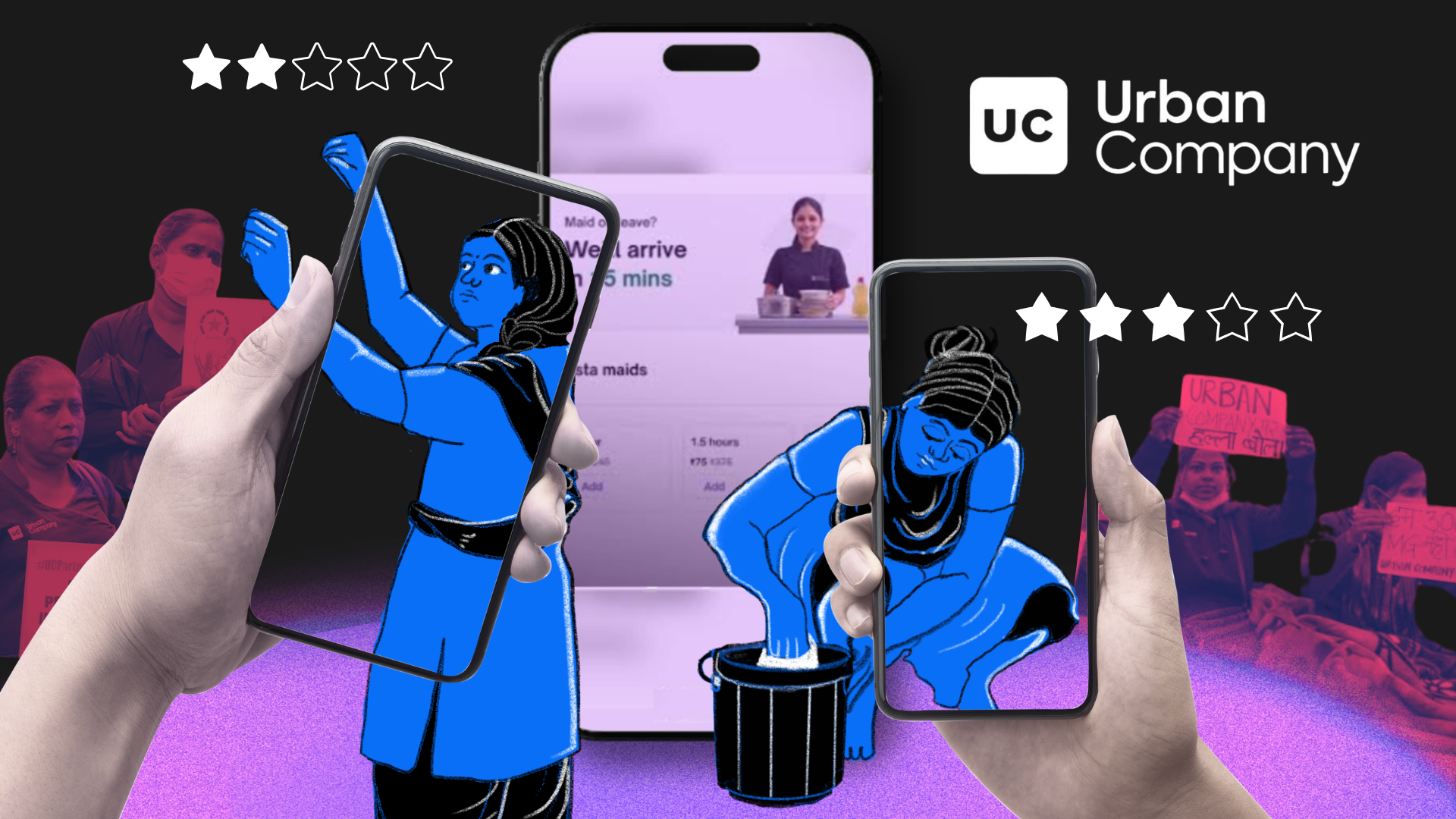‘Gig Platforms Will Intensify the Disposability of Domestic Workers’
What does Urban Company’s ‘Insta Help’ service mean for India’s unique domestic labour market? We spoke to scholar Sai Amulya Komarraju for answers

In our editorial series BehanBox Talkies, we explore ideas through the lens of scholars.
Does a quick domestic help delivery service amount to modern slavery? Unions and activists posed this question in response to Urban Company’s entry into quick commerce with its Insta Maid (later changed to Insta Help) service this month.
The app-based service platform offers a range of at-home services – plumbing, cleaning, beauty treatments, repair, etc – many available the same day or within a few hours. Now it would offer on-hire domestic help within 15 minutes for household chores like scouring utensils or prepping meals, all at introductory rates of Rs. 45 per hour, later to be scaled to Rs 245 per hour. The service is currently being piloted in Mumbai. The ‘partner’, it is claimed, can earn at least Rs 20,000 per month if they work six days a week for 132 hours, in addition to insurance entitlements.
But workers disagree with what the company calls a ‘win-win model’. The “high pressure, high risk work environment” reduces human labour to a disposable app feature, unions say. Platformisation of domestic labour, mediated through the quick commerce template, will exploit cheap labour in abundant supply without the assurance of social security, safety, or fair pay, they add. Moreover, algorithmic mediation on platforms like UC has in the past favoured customers over the ‘partners’ subjected to penalties and rating systems, as we reported here and here.
Domestic workers in India, mostly women and girls from marginalised communities, operate in a unique labour market. They are dependent on their employers – families or agencies – due to missing legal protection, and have no bargaining power. In the platform economy model, their dependence now rests with the customer, the company, and an impersonal algorithm. In this market, what happens to workers’ rights, dignity, and collective identity? Saumya Kalia speaks to Sai Amulya Komarraju, an assistant professor of communications at IIM Ahmedabad and a scholar on gender and digital labour, for answers.
Platform-mediated hiring of domestic help itself is not new – BookMyBai, BookMyNanny, MrRight.in, and placement agencies have been around for more than a decade. What distinguishes Urban Company’s new service?
Before digital platforms, agencies acted as intermediaries; platforms are simply new players in this space. However, the very idea that one can book domestic workers in under 15 minutes, like any other service, is problematic. Digital intermediation of personal services does not simply connect workers to jobs—it transforms workers themselves into the service being offered. In the delivery sector, the service being offered is the transport of food; in ride-hailing, the service is being driven. But in domestic work, the service is not just help—it is the helper.
The shift from ‘Insta Maid’ to ‘Insta Help’ does not undo the underlying dehumanisation in play.
We have quick commerce for medicines, groceries, plumbing, beauty services. Why rope in domestic labour into platform economies too?
Indeed, this is happening at an interesting time. Dishwashers, washing machines, and robot vacuum cleaners are becoming commonplace. Will dishwashers or washing machines replace domestic workers? Employers still request domestic workers to dry clothes on the laundry line or clean the plates that go into the dishwasher. Platforms like UC will probably train workers to use these new, sophisticated technologies. Make workers tech-ready so that middle-class customers do not experience any inconvenience, knowing that tech-trained workers are taking (even the least) laborious work off their hands. But the same might create newer forms of exclusion — tech-ready workers leaving behind working-class women who are not even allowed to access phones, much less own them. There are promises, but there are challenges as well.
Also, this is not just about UC; the issues of on-demand domestic work are much bigger.
Domestic workers make up one of the largest women-dominated unorganised sectors in India. What factors unique to this labour market would UC have to think about?
It might be too optimistic of us to think that platforms will want to think about the highly interpersonal nature of domestic work or geographical location from a worker-centric perspective. As for profit logic, they would have to think about how women take up domestic work – their relationships with homeowners, working multiple homes in a day, etc. Employers earlier found domestic help through word of mouth; they had the responsibility of maintaining a cordial relationship – if not outright respect – to prevent workers from quitting. The risk of losing face in their social circles/apartment complexes and not finding another worker would compel them to treat domestic workers with a modicum of respect. In traditional employment, workers establish what scholars Raka Ray and Seemin Qayum call ‘strategic intimacy’ – a form of closeness that enables them to negotiate for loans, additional leave, or other financial benefits. Platforms are systematically eroding the social dimension of this employer-domestic worker relationship, leaving no room for negotiation. Customers don’t even have to know the name of the worker, let alone develop a long-term relationship. There is no scope for negotiation, either with the platform or the ‘customer’.
There are also other granular details such as women’s access to mobile phones, vehicles, willingness to use public transport, domestic responsibilities, even curfew timings at home. Another question to think about is if they intend to register women workers only or include men. Historically in India men – and not women – worked as servants. Are they going to bring that back to circumvent problems with hiring women? Will there be a (re)masculinisation of domestic work?
Why would a domestic worker sign up to be an ‘Insta Help’?
This is a new initiative, and we still need to observe the extent to which documentation, registration, or KYCs serve as deterrents. But we do have an unemployment problem. Poverty and unemployment are two of the biggest drivers behind workers taking up work that involves personal services. For women, it is the promise of professionalisation, respectability, and dignity that might be the biggest pull. Take the case of South Africa: young Black women choose on-demand domestic work because they have witnessed their mothers, grandmothers, and relatives slave away in the homes of white madams. The temporality of platform work frees workers from a slave-master, maid-madam relationship. Perhaps, workers in this instance also might find the professionalisation of domestic work elevates them from being a ‘didi’ or a ‘behen/ben’ to a professional. However, this does not negate the many ways in which platforms reproduce servitude. Workers are keenly aware of the trade-off.
For delivery services, there are warehouses and data on the demand of the area. How do you think Urban Company will manage the supply of domestic workers? Will the model be similar to what they do for beauty services?
I don’t see why not. Urban Company has transitioned from being an online marketplace to a digital intermediary, and now to a full-stack model. The latter allows them to exert control over the entire supply chain in the beauty vertical. They have set up warehouses to stock necessary beauty items; established strategic partnerships; and are doing everything possible to offer a ‘lifestyle experience’ to customers. The data they have collected over the years helps with predictive analytics—demand cycles—for say, a sudden craze for roll-on waxes, or identifying hubs that generate more leads. All of this has helped them perfect their matchmaking algorithm. The same can happen for Insta Help.
Five years ago, researchers found that some platforms struggle to meet the legal minimum wage requirement for domestic labour and also that the promised hourly wage rate of Rs 260 could be ‘unsustainable’ in the long run. What is the legitimacy and sustainability of UC’s promise of an hourly wage rate of Rs. 245?
Domestic workers have a way of segregating neighbourhoods and coming up with their ‘going’ rate, depending on whether it’s a high- or low-income area. The minimum rates are discussed by the workers in a democratic manner; there is shared decision-making.
The same may not happen with UC. In the beginning, the company might be willing to pay more to service partners or charge less commission, but once there is user stickiness and service provider stickiness, it is easy for them to then manipulate whatever money that they’re paying. Terms and conditions keep changing. On-demand beauty workers were very happy with their earnings when the vertical was newly launched. It was the same with Uber/Ola drivers. However, as platforms scale and more service providers join, they begin to charge more commissions and launch features that take away flexibility—for instance, the auto-acceptance feature. Platforms can raise hourly wages only to artificially lower them later, charge higher commissions, or offer discounts to consumers — practices that many platforms have already employed. [UC beauty workers have argued that the company’s commissions, penalty for cancellations, and travel and product costs eat into their monthly earnings.]
This is why the Social Security 2020 Bill is crucial. Apart from social security, platforms must be obligated to meet the minimum wage levels. With Urban Company providing “cheap labour”, the immediate threat is wage depression across the sector.
How do you see the argument that UC’s model could help standardise wage rates and formalise this unorganised sector? The company has argued against a minimum wage and for a living wage, that people need to afford a ‘decent’ standard of living.
Standardisation of wages is a complex issue. It can help reduce wage gaps among workers and ensure fair payment, but enforcement remains a significant challenge. Moreover, wage standardisation alone does not fully protect against rising living costs – inflation [too] must be accounted for. The Minimum Wages Act includes a provision for a Variable Dearness Allowance (VDA) to adjust for inflation, but platforms operate as digital intermediaries, not employers. So they operate in a grey area, making it easier for them not to meet the minimum wage requirements now or living wage requirements whenever they are rolled out.
In the context of India and other countries in the Global South, formalisation may not be the appropriate lengths to which one needs to look at care work. For example, there are many instances where women don’t share how much they earn with their families a) because they want to save and b) the family expects women to share their entire earnings. Women may feel the knowledge of their income is a risk for their own well being and for the well being of the family. Formalisation is definitely an aspect of dignity, but there are so many other issues involved – especially in a country like India which is so stratified. We have to ask if formalisation is something that they want. Platforms encode worker precarity by formalising and institutionalising inequalities through platform policies.
Formalisation/platformisation and informal labour may not be the most appropriate dichotomy through which one analyses care work and care platforms. At the heart of any worker movement is finding dignity in work, at work, of work. Engaging in meaningful work is what they’re asking for.
Most domestic workers in India are Adivasi and Dalit women, as BehanBox has reported. This factor adds a layer of complexity to domestic work. How will this class and caste aspect fit into an algorithmic-driven worker allocation?
We know that platforms reproduce caste and class inequalities in India, we see this happening in the beauty sector already. Beauty workers say there’s usually a designated room for beauty workers, and that room has everything that a beauty worker would need — a washroom, for instance — and the hope is that the beauty worker will not venture outside of that particular space. It was disheartening to see how the pandemic pronounced these issues. Urban Company’s guidelines involved cleaning the switches that they would touch, for instance, because there was this fear of spreading the virus. Even if beauty workers won’t call it caste discrimination, we know from our context that the basis of all this discrimination is in the pronounced caste system that keeps getting reproduced. And platforms don’t exist in vacuum. A case can be made that as platforms get familiar with the context that they operate in, whether it is the legal or social cultural context, they leverage existing loopholes and hierarchies to ensure that their profit logic is served.
Historically, domestic work has been stigmatised as dirty, so customers may not want someone from outside their caste to do the cleaning work. Perhaps if their caste matches, customers might be more sympathetic. The question is, which women, from what socioeconomic backgrounds, are registering as a domestic worker on these platforms?
A study showed UC deployed gamification strategies through leads or credit systems to affect worker behaviour. How would this gamification play out in the domestic worker market?
Gamification has been leveraged to nudge workers into taking up more work, performing docility, and going out of their way to accommodate customer requests to get a better rating. We also know from studies emerging from South Africa that history and context play a huge role in how workers are treated by customers. Black women are over-represented in domestic work, and because of the Apartheid legacy, customers expect workers to dispose of sanitary napkins and clean blood stains. In the Indian context, we saw how platform workers were treated by residential welfare associations during the pandemic or how sanitation workers are expected to handle hazardous wastes.
Additionally, there is a real risk of platforms creating hierarchies within the domestic worker community—distinguishing between “professional” and “non-professional” domestic workers. Reports on women’s access to technology show that women still do not have access to individual phones and used shared devices. The immediate threat is that these women will be excluded from platform mediated domestic work because UC or other platforms would want basic literacy – like being able to log into your phone. That is not desirable: it creates hierarchies within the domestic work occupation. You would have domestic workers who are “professional” and those who are not, and can thus be paid less and exploited.
Girls and women make up the majority of domestic workers in India, between 4.2 million to 50 million. Safety is a barrier for them, show reports. One analysis showed most Urban Company female workers were accompanied by male members to different workplaces. Unions have highlighted the concern that platforms could leave domestic workers exposed to abuse and human trafficking. What measures can platforms take to avoid this?
The PoSH Act is inclusive of every “aggrieved woman” — female employees, clients, customers, and domestic workers – regardless of age, employment status, or sector. However, our laws need teeth. Given the highly stratified nature of our society, the hierarchies, and the social norms, working-class women do not have the necessary support to lodge official complaints. These are issues domestic worker unions have raised time and again. Platforms are very clear that they are only intermediaries and do not take responsibility for worker safety. Once a worker enters the customer’s home, they are responsible for their safety.
Legally, women will most likely be classified as ‘platform workers’. Its operationalisation and the laws that will govern such work depend on the Social Security Bill.
Recent online discourse has villainised domestic workers for being ‘unreliable’ or unprofessional. Will this narrative strengthen with UC’s entry?
The concept of ‘reliability’ needs unpacking: reliability does not really start or end with a domestic worker not taking a day off. It is about not uttering a word, not making your presence felt, basically complete compliance. Traditionally, an employer trains the domestic worker on how they want the work to be done, and then they negotiate. There’s a back and forth, and finally the two come to a common ground. But now with UC, there would be no scope for negotiation. Workers would come pre-trained; the customer does not have to deal with the domestic worker at all. What do middle class customers think professionalism means? It’s not just about not taking two or three days off – it’s about a certain kind of docility they expect from working classes.
What UC chooses to name their offering is revealing and symptomatic of the problem — but not the problem itself. The core issues are the complete erosion of the social dimensions of the domestic worker and employer relationship and, relatedly, the dehumanisation of workers and the need for instant gratification of all kinds of needs.
A 2020 consultation between Karnataka government, researchers, and domestic workers concluded that enabling collectivisation improves the conditions of domestic workers in the gig economy. Your paper showed domestic workers build a ‘whisper network’ during shared auto savaris (rides) or while walking from one house to the other. They decided the ‘going rate’, negotiated leaves and warned each other against abusive homeowners. With platforms entering this space, what happens to these networks?
Abhiraj Singh Bhal (the co-founder of Urban Company) argued for consultations between the company, government of India, and gig worker representatives. We know partners are hesitant and may not be vocal fearing backlash and punitive action. The only way forward is to have union representatives – but companies do not want unionisation, and without unionisation, there is no collective bargaining.
Also, it is worth noting that unionisation is male dominated in India. There’s definitely an over-representation of women in domestic work, and they do have strong organisations and unions, however, one would have to actively include these organisations, regardless of their size and how informal they might be. Savari was one such — it’s a very informal way of collectivising, but they find ways that work for them. Whisper networks will continue into the platform economy. We saw that with on-demand beauty workers. Worker agency and resistance will always find expression. But there needs to be a concerted effort to include women in any of these unionisation efforts.
Currently, ‘domestic workers’ is a stronger source of collective identity than ‘gig workers’ or ‘platform workers’. However, domestic work is not a new occupation. They have strong unions, and it is entirely possible for a global domestic workers’ solidarity movement to take off. Hope is important in these precarious times.
Can we expect an even greater feminisation of domestic labour?
We will need to clarify what feminisation means. Feminisation is popularly understood as the increasing presence of women, or over-representation of women in a certain sector, or merely as women’s work. But feminisation is about the systematic devaluation of certain occupations that are labelled dull, dirty, demeaning, and repetitive. Undervalued, and therefore underpaid jobs; conditions of work that are not conducive to worker well-being; limited opportunities to upskill; lack of autonomy; lack of safeguards (physical, mental, and financial), and work that is highly standardised to the extent of deskilling workers, where workers aren’t empowered. All of these lead to feminisation. Such work inevitably falls on those who are the most marginalised–lower caste, lower class, more often than not, women. And we see this happening in platform work.
SOPs from platform companies are meant to make workers more time-efficient, not skill-efficient or upskilling. The more time-efficient a worker is, the quicker a service is rendered; the quicker a service is rendered, the better for the platform. Platforms are leveraging self-learning algorithms to exert control over all aspects of platform work, reducing worker autonomy. Platforms in majority-world contexts promise professionalisation of personal services, flexibility, autonomy, and respectability. However, we now know that increasing commissions, time-efficient work, blended (tripartite) supervision by platform managers, algorithms, and customers, and weaponisation of gamification and incentivisation, lead to greater feminisation of work.
Ultimately, platformisation is intensifying the disposability of domestic workers. By eliminating social bonds, and promising a 15-minute turnaround, platforms reinforce and strengthen an extractive labour model.
What happens when the inbuilt servitude of the domestic labour market interacts with the servitude designed into the platform economy?
This is an important question. Take the case of the US: white domestic workers earn more money and receive better treatment. On top of existing precarities, algorithmic management of workers and gamification will exacerbate their experience of servitude. The only way to ensure lasting change is a transformation of the interconnected forces of regulation—social norms, design, policy, and the market.
All of us are complicit in the reproduction of inequalities. However, this does not mean that platforms cannot affect change. Beauty workers I spoke with are appreciative of the platforms they work for. They acknowledge and are grateful for the opportunities it has provided. Platforms must reciprocate in kind, and this involves going beyond the tactic of ‘carewashing’.
We believe everyone deserves equal access to accurate news. Support from our readers enables us to keep our journalism open and free for everyone, all over the world.




